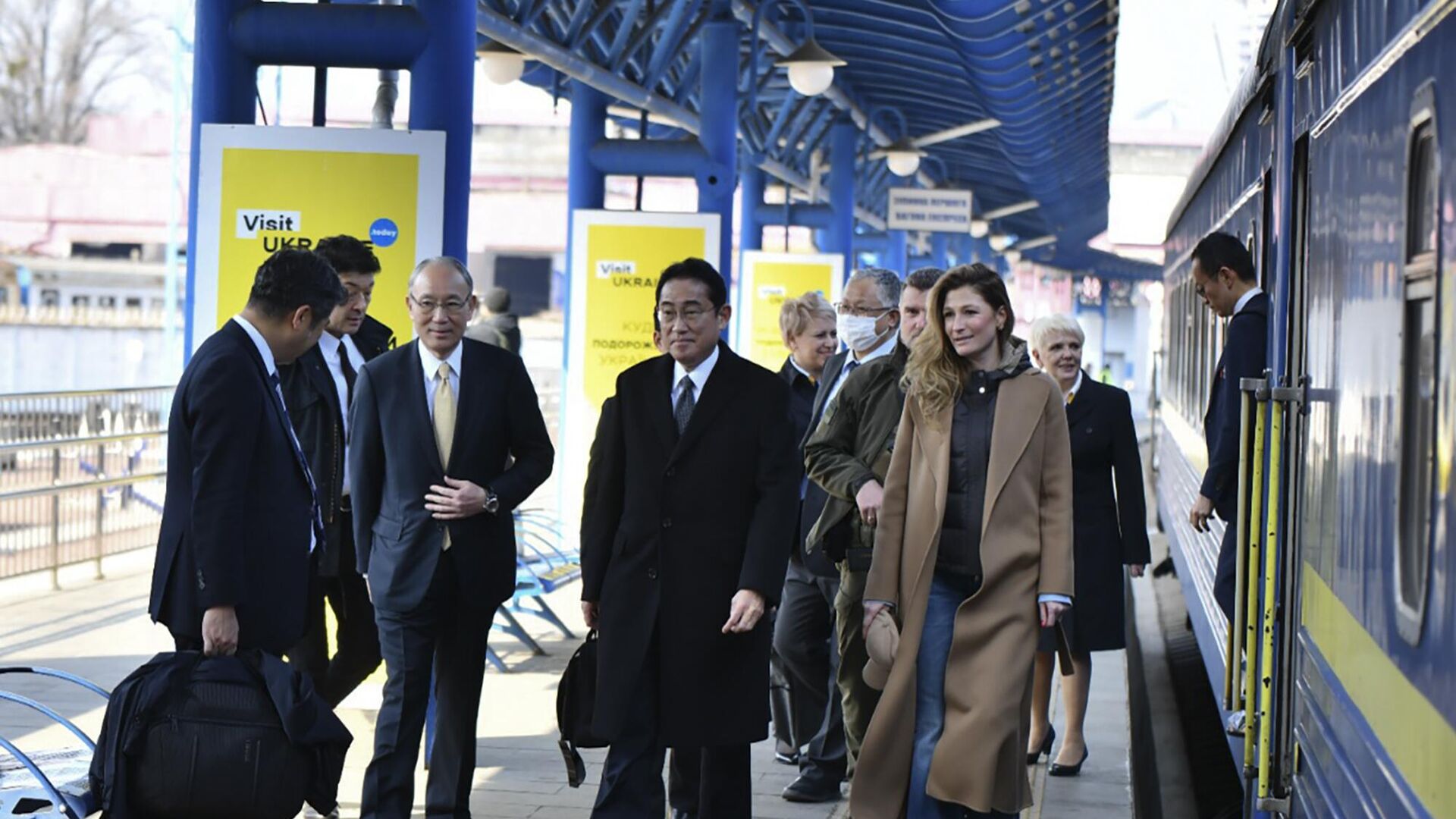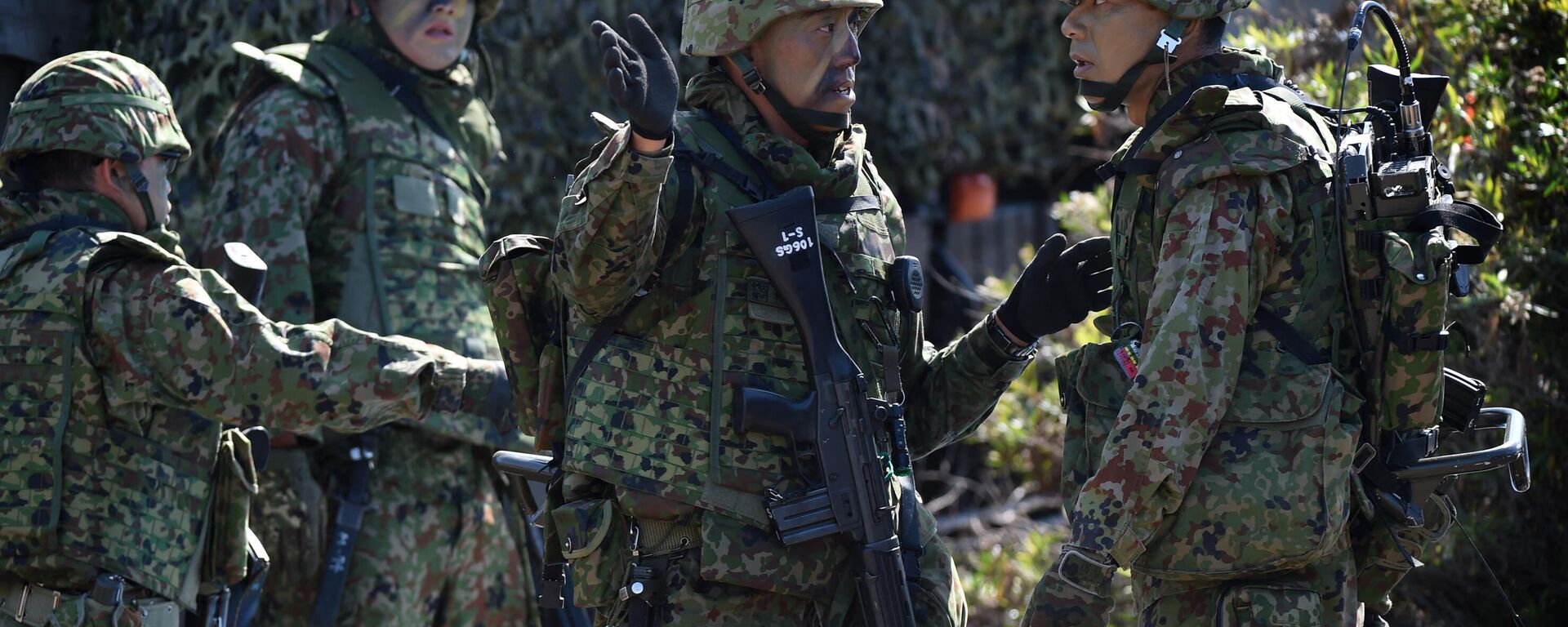Japanese PM's Ukraine Visit: Putting On a Good Face for the West and Avoiding Damage?

© AP Photo / Ukrainian Presidential Press Office
Subscribe
Alexander Panov, Professor at the Diplomacy Department at MGIMO Russia, Chief Research Fellow of the Institute for U.S. and Canadian Studies, Ambassador Extraordinary and Plenipotentiary (former Russian Ambassador to Japan) shared his opinion about Kishida's visit to Ukraine with Sputnik.
G7 ‘Host Role’ Obligates
The main reason is that Japan is chairing the G7 this year, the expert believes:
"Accordingly, Prime Minister Kishida is now vigorously gearing up for the Hiroshima Summit. First of all, to demonstrate that Japan is the West's reliable ally in resolving the Ukrainian crisis. Therefore, Kishida is visiting Kiev to show his solidarity with Kiev. But most importantly, to show Japan's important role in the G7 and to invite Zelensky to come to the Hiroshima Summit or to address it via video link".
Solidarity, More Like Lip Service
Meanwhile, despite Tokyo's demonstration of solidarity with Kiev in the Ukrainian conflict, Japan is contributing less economic help to Ukraine than other countries are, the expert noted.
“As far as economic assistance is concerned, Japan will provide $1.5 billion to Ukraine. And not in the form of direct aid, but in the form of loans. And compared to what Europe and the US are giving, this is not much at all. Moreover, Japan is taking in very few refugees from Ukraine (about a thousand). The situation is similar when it comes to sending various kinds of aid to Ukraine. Japan has limited itself to bulletproof vests, helmets and some humanitarian aid. And since Tokyo prohibits the supply of weapons to countries where armed conflicts are taking place, no weapons are being supplied,” Panov pointed out.
Japan is doing this so as not to be out of line with the collective West. Especially since Ukraine will be one of the main topics at the summit in Hiroshima.
Japan To Play ‘Asian Watchdog’ Rather Than China
In addition, the Japanese feel that they now have a chance to prove themselves as the "Asian pillar" of the West, Alexander Panov believes.
“And, to some extent, [Japan hopes] to play the "watchdog" role in Asian affairs during this period. Meanwhile, Tokyo's main concern is Beijing. It is Japan's main ‘headache’. Long-standing debates in Asia have focused on the fact that if China begins to take Taiwan by force, it will threaten Japan's interests as well. Since in this case, the US could provide military assistance to Taiwan, and then a retaliatory strike by Beijing would be launched against American bases on Japanese soil. In addition, it is predicted that after Taiwan, China will begin to move south toward the Senkaku (or Diaoyudao) Islands, and then it will head to Okinawa. So based on these predictions, Japan is now building up its defensive position by placing garrisons on the Nansei Island chain bordering Okinawa. Recently, the Japanese opened a new military base on the island of Ishigaki, near Okinawa, and announced that they would beef up their defensive capabilities.”
And Tokyo will ramp its military spending up to NATO’s standard of 2% of GDP, creating the capacity to counterattack those bases from which threats to Japan may emanate, the expert added.
According to the current Japanese leadership, Tokyo’s militarization course is the way to peace in the region. And this is in line with Japan's current policy of becoming more and more active in the sphere of international relations.
Thus, the Japanese are now "fidgeting" a lot, not wanting to miss their chance to enhance their country's role both in the West and in world politics in general. So as to show the international community how much Japan is an "important player".
The West is encouraging this behavior because Japan has decided to sacrifice its relations with Russia.
An Attempt to Avoid Irreparable Damage
In reality, however, Japan's own economic interests may become the "ritual sacrifice" of this policy.
Tokyo is aware of this, which is why – despite its solidarity with Ukraine and its own anti-Russian sanctions – it is trying to "hang on" and stay where it still can.
“In its relations with Moscow, Tokyo has opted for a tough sanctions policy, something that has never happened before in Russian-Japanese relations. Political dialogue between the two countries has practically ceased, and Japanese companies are leaving Russia. Not all of them, of course: according to statistics, only 30% have left. However, there are Japanese companies in the energy sector that are involved in the Sakhalin and Arctic LNG-2 projects. Japan preferred to maintain its participation in these projects,” Panov noted.


